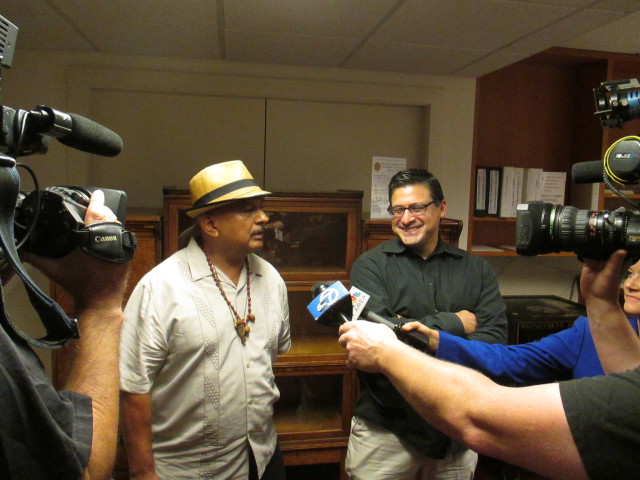Ed Lee has no major opponents — but the voters can weigh in on his policies

By Tim Redmond
JULY 7, 2015 – The fall election came into more clear focus this afternoon as the supporters of five ballot initiatives filed what are likely to be enough signatures to put the measures on the ballot.
And while Mayor Ed Lee has no major opponents in his campaign for re-election, two of the ballot measures – and the District Three race – will serve in part as referendums on his policies.
The biggest news: The Mission Moratorium, which many argued would never be able to qualify for the ballot in such a short period of time, delivered more than 15,000 signatures collected in just 19 days.
Much of the work was done by volunteers; campaign leaders told me they spent roughly $10,000, which at $2 a signature would have accounted for only a third of the names.
The city has to verify that 9,700 signatures are valid.
The measures everyone knew were likely to qualify were the proposal by the Giants to develop a parking lot near AT&T Park; a measure by PG&E’s allies that seeks to undermine the city’s clean power program; A proposal to limit short-term rentals by companies like Airbnb; and a proposal by SF State professor and political consultant David Lee that would mandate more video coverage of city meetings and allow online comments.
“We were told it couldn’t be done,” Roberto Hernandez, who helped organize the Mission Moratorium effort, said at a press conference at the Department of Elections. “But we did it in 19 days. Added Gabriel Medina: “People are sick and tired of the displacement of hard-working families … if we can’t protect the Mission, we can’t protect any neighborhood.”
Earlier in the day, Share Better SF submitted 15,983 signatures (generally speaking, 15,000 is enough to guarantee that the measure will qualify) for a law that will tighten up the rules for short-term rentals.
“Last week, the City announced that it had sent violation notices for 70 illegal Airbnb rentals,” said Doug Engmann, former president of the San Francisco Planning Commission. “That’s a drop in the bucket compared to the thousands of units that are illegally rented as hotel rooms every night of the week. Every independent analyst that’s examined the issue reached the same conclusion – any limits on Airbnb rentals are unenforceable unless the City 1) has access to rental data and 2) allows companies to advertise only registered units. Our measure provides the tools necessary for effective enforcement of the law, eliminates incentives for evictions, and protects affordable housing.”
The Mission Moratorium might have won nine votes at the Board of Supervisors, but the mayor strongly opposed it, and instead it received only seven, two short of the super-majority needed for these types of zoning controls.
The mayor strongly supported the original Airbnb bill by then-Sup. David Chiu that by many accounts has been a failure for the city (but quite lucrative for the short-term rental company).
So on those two key policy issues, the voters will get to decide if they support what the mayor is doing, or if they see the city going in the wrong direction.
Both are central to the debate over San Francisco’s future: The mayor has staked the city’s soul on increasing tech jobs and supporting tech companies, although the impacts have been felt all over town. The failure of the city to plan – that is, to make sure there was enough affordable housing, or money to pay for it, before City Hall attracted tens of thousands of new, high-paid workers – has made San Francisco a national case study in urban planning.
If voters approve the Airbnb measure, it will be a direct rejection of one of Lee’s signature policies (and one of his biggest backers, Ron Conway, an Airbnb investor). If the entire city agrees that we need to slow down development in the Mission, it will be a statement that the mayor is letting too much happen, too fast.
Meanwhile, the D3 race is quickly becoming a citywide concern.
Both candidates, Sup. Julie Christensen and former Sup. Aaron Peskin, have been raising money; as of Christensen had raised $159,000 and Peskin $167,000. The money is coming in not just from D3 but from all over the city – because people on both sides realize that this race could tip the balance of power on the Board of Supervisors.
Right now we’re seeing a lot of 6-5 votes, with the moderate-to-conservative bloc in control. If Peskin replaced Christensen, that balance would flip – and there would potentially be a board majority more willing to challenge the policies and priorities of the Lee Administration.
Both sides are not only aware of this, they’re pushing the argument.
District elections are in part about district issues, and both candidates are working hard to be the voice of the residents, small businesses, and neighborhood groups. But the overall politics of the city, and the policies of the mayor, are going to be a big part of this race.
So no real high-profile mayoral debate – but a lot of proxy issues that will let San Franciscans weigh on the direction of the city.



